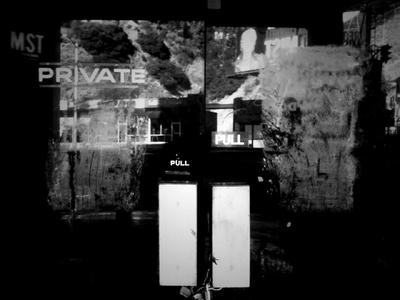CANDLE
And, I awoke with a start that you could not see, but you could feel if you were inside my body.
“GENERRAL MOTORRS…!!! came a bellowing announcement of absurdity, like a savage command from another world across the room.
Laying in that fold-out, armchair-bed in the converted balcony, I opened my eyes slowly to see him--a Politburo Brezhnev look-alike with monstrous brows, bulbous nose, big dynamite stick fingered hands clasped behind his back in unmistakably ministerial fashion. The white hair thinning across his huge noggin was combed back and the look of an enraged dictator shone from his piercing blue eyes.
He bellowed, again, “PENCILBOXXX…!!!”
I looked at him from under the blanket, barely able to contain myself, as he stepped forward, pointing his big, right index finger into the air as he announced to the world, solemnly, “N… B… A… How do you do…?
I started laughing and sat up as a sweet smile slowly transformed Torkom Dikranovich’s imposing face into brightness. It was as if that new face had collected all the available light in the room like some advanced night vision device and the rays beamed out as he started laughing.
“Ara, Jaan…!!! How did it sound?”
“Perfect, Torkm Dikranovich, perfect…”
Torkom Dikranovich was the second husband of my Babushkaesque great aunt—now deceased-- whose family had migrated to Armenia in the 1930’s in a post-genocide patriotic gesture, which was forever regretted. Times were so tough that the family had to move to another great lifestyle destination—Kharkov, in the Ukraine--shortly thereafter, where Annya remained until 1964, enduring Nazi invasions, pogroms, and purges.
Torkom Dikranovich was a former colonel in the Soviet Army--Ciphers Division--survivor of and participant in the battle of Leningrad, (a Great Patriotic War veteran…), dear friend to renowned painters and men of letters, beloved grandpa, and, also, when necessary, a man of fear-inducing command presence.
He had often conned his way into VIP accommodations and service just by looking like Brezhnev or some other big shot.
The English language non-sequitors? He learned these on his own and were the majority of his Anglophone repertoire.
“TORKOM…!!! TORKOM!!!…” The buzz-killing, buzz-saw voice of Annya Mikhaelovna cut through all things and the immediate defeat in Torkom’s ebullience was Richter scale worthy and just as abrupt as any quake. The real dictator had risen and was in fact kicking ass, but no names would be taken.
We cringed together.
“TORKOM…!!! Leave him alone, you old goat… Did you heat up the water, huh…? The boy needs a good bath, you wretched beast… and see if there are candles in the bathroom… God… Must I tell you these things…?”
It was 1992 in the former Soviet Union and I was well into doing my second tour in a Homeland that was not truly mine, but became more so just as any truly loving family becomes an orphan’s endless devotion.
The country had been blockaded on two sides, sometimes three. Electricity was almost non-existent, natural gas didn’t come easy, and everything was ungodly expensive, if available.
I stayed with Annya and Torkom, at Annya’s one bedroom, first floor apartment, when I was not in the outlying regions or the war zone proper.
The blockade and escalating war also accounted for the presence of the wood burning stove in the middle of this late 20th century living room, its ramshackle piping running out through a hole cut in the window, as well as a variety of survival accoutrements--a battery powered short wave radio, some flashlights, dry fuel cells, and a whole slew of other knick-knack tricks, including, of course, candles.
Candles.
Candles had become a hot commodity in this great city of light that had now mostly no light--or rather had now little light. We were able to acquire our share of the waxen totems from local markets and commission shops, thanks to Annya’s clever ways and my pittance of American dollars.
The city was pure darkness late at night and during the early morning hours—a darkness no city dweller ever really knows, a pitch that rivals onyx or obsidian and covers all that should have been lit up.
Cities were supposed to have light, especially in the dark.
Yerevan had become a pure, dark, ghost town at night.
Pure dark…
Except, of course, the points of light emanating from those using candles--store bought, homemade, church stolen, village got—from those still reading by the sometime dim, sometime bright candlelight. Awake were those so sick of the dark that they refused to sleep, and lit more candles to--in their own way—“rage against the dying of the light” that had been going on for some time.
But, since candles were the savior, they were to be hated as well.
The blockade and lack of electricity exacerbated candle use, but people longed for light--real electric light. Candlelight dinners were no longer romantic. The glow was a reminder of these trying times and could be seen everywhere, shedding a melancholic pallor across all things and people.
Dinner by candlelight… every single night.
Torkom Dikranovich had become a sort of expert in the candle trade. Maybe his stint in the military and particularly his grievous time of blockade in the northern climes, during the Great Patriotic War, gave him his "candle edge."
I would often see him sitting at the table with the Samovar, not only organizing the candles—cutting, scraping, and saving them--but creating ancillary devices meant to maximize the candles longevity and power to illuminate.
He cut reflector holders for the candles from old soda cans and instant coffee containers, increasing lumens exponentially. He was proud of his work and even Annya Mikhaelovna, in all her oppressive grandeur, complimented him.
“Maladyetz… Bravo, Torkom, that’s wonderful… You’ve finally done something useful, Lazy giant…
"Get the dishes on the table, you slouch of a man… I’ve made cutlet--the boy’s favorite…"
"Oh… and, put some candles on the table, will you…?”
--akm
© Ara Mgrdichian
“GENERRAL MOTORRS…!!! came a bellowing announcement of absurdity, like a savage command from another world across the room.
Laying in that fold-out, armchair-bed in the converted balcony, I opened my eyes slowly to see him--a Politburo Brezhnev look-alike with monstrous brows, bulbous nose, big dynamite stick fingered hands clasped behind his back in unmistakably ministerial fashion. The white hair thinning across his huge noggin was combed back and the look of an enraged dictator shone from his piercing blue eyes.
He bellowed, again, “PENCILBOXXX…!!!”
I looked at him from under the blanket, barely able to contain myself, as he stepped forward, pointing his big, right index finger into the air as he announced to the world, solemnly, “N… B… A… How do you do…?
I started laughing and sat up as a sweet smile slowly transformed Torkom Dikranovich’s imposing face into brightness. It was as if that new face had collected all the available light in the room like some advanced night vision device and the rays beamed out as he started laughing.
“Ara, Jaan…!!! How did it sound?”
“Perfect, Torkm Dikranovich, perfect…”
Torkom Dikranovich was the second husband of my Babushkaesque great aunt—now deceased-- whose family had migrated to Armenia in the 1930’s in a post-genocide patriotic gesture, which was forever regretted. Times were so tough that the family had to move to another great lifestyle destination—Kharkov, in the Ukraine--shortly thereafter, where Annya remained until 1964, enduring Nazi invasions, pogroms, and purges.
Torkom Dikranovich was a former colonel in the Soviet Army--Ciphers Division--survivor of and participant in the battle of Leningrad, (a Great Patriotic War veteran…), dear friend to renowned painters and men of letters, beloved grandpa, and, also, when necessary, a man of fear-inducing command presence.
He had often conned his way into VIP accommodations and service just by looking like Brezhnev or some other big shot.
The English language non-sequitors? He learned these on his own and were the majority of his Anglophone repertoire.
“TORKOM…!!! TORKOM!!!…” The buzz-killing, buzz-saw voice of Annya Mikhaelovna cut through all things and the immediate defeat in Torkom’s ebullience was Richter scale worthy and just as abrupt as any quake. The real dictator had risen and was in fact kicking ass, but no names would be taken.
We cringed together.
“TORKOM…!!! Leave him alone, you old goat… Did you heat up the water, huh…? The boy needs a good bath, you wretched beast… and see if there are candles in the bathroom… God… Must I tell you these things…?”
It was 1992 in the former Soviet Union and I was well into doing my second tour in a Homeland that was not truly mine, but became more so just as any truly loving family becomes an orphan’s endless devotion.
The country had been blockaded on two sides, sometimes three. Electricity was almost non-existent, natural gas didn’t come easy, and everything was ungodly expensive, if available.
I stayed with Annya and Torkom, at Annya’s one bedroom, first floor apartment, when I was not in the outlying regions or the war zone proper.
The blockade and escalating war also accounted for the presence of the wood burning stove in the middle of this late 20th century living room, its ramshackle piping running out through a hole cut in the window, as well as a variety of survival accoutrements--a battery powered short wave radio, some flashlights, dry fuel cells, and a whole slew of other knick-knack tricks, including, of course, candles.
Candles.
Candles had become a hot commodity in this great city of light that had now mostly no light--or rather had now little light. We were able to acquire our share of the waxen totems from local markets and commission shops, thanks to Annya’s clever ways and my pittance of American dollars.
The city was pure darkness late at night and during the early morning hours—a darkness no city dweller ever really knows, a pitch that rivals onyx or obsidian and covers all that should have been lit up.
Cities were supposed to have light, especially in the dark.
Yerevan had become a pure, dark, ghost town at night.
Pure dark…
Except, of course, the points of light emanating from those using candles--store bought, homemade, church stolen, village got—from those still reading by the sometime dim, sometime bright candlelight. Awake were those so sick of the dark that they refused to sleep, and lit more candles to--in their own way—“rage against the dying of the light” that had been going on for some time.
But, since candles were the savior, they were to be hated as well.
The blockade and lack of electricity exacerbated candle use, but people longed for light--real electric light. Candlelight dinners were no longer romantic. The glow was a reminder of these trying times and could be seen everywhere, shedding a melancholic pallor across all things and people.
Dinner by candlelight… every single night.
Torkom Dikranovich had become a sort of expert in the candle trade. Maybe his stint in the military and particularly his grievous time of blockade in the northern climes, during the Great Patriotic War, gave him his "candle edge."
I would often see him sitting at the table with the Samovar, not only organizing the candles—cutting, scraping, and saving them--but creating ancillary devices meant to maximize the candles longevity and power to illuminate.
He cut reflector holders for the candles from old soda cans and instant coffee containers, increasing lumens exponentially. He was proud of his work and even Annya Mikhaelovna, in all her oppressive grandeur, complimented him.
“Maladyetz… Bravo, Torkom, that’s wonderful… You’ve finally done something useful, Lazy giant…
"Get the dishes on the table, you slouch of a man… I’ve made cutlet--the boy’s favorite…"
"Oh… and, put some candles on the table, will you…?”
--akm
© Ara Mgrdichian


